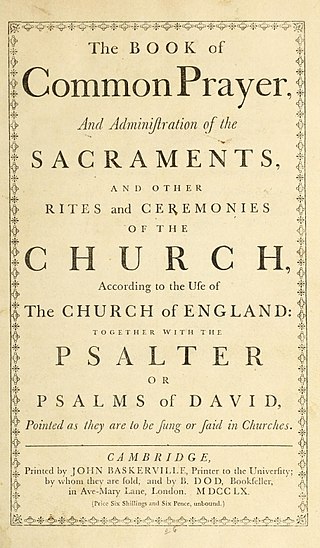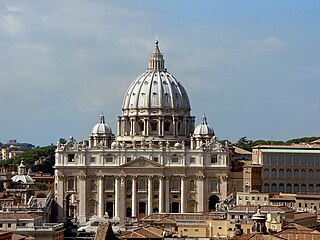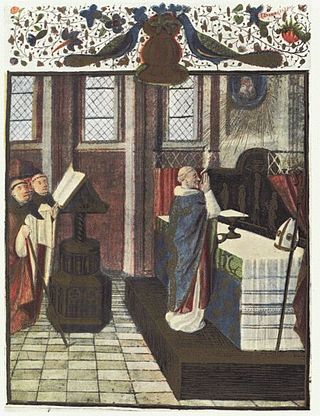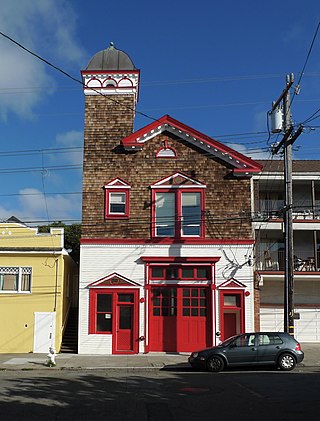
The Book of Common Prayer (BCP) is the name given to a number of related prayer books used in the Anglican Communion and by other Christian churches historically related to Anglicanism. The first prayer book, published in 1549 in the reign of King Edward VI of England, was a product of the English Reformation following the break with Rome. The 1549 work was the first prayer book to include the complete forms of service for daily and Sunday worship in English. It contains Morning Prayer, Evening Prayer, the Litany, Holy Communion, and occasional services in full: the orders for Baptism, Confirmation, Marriage, "prayers to be said with the sick", and a funeral service. It also sets out in full the "propers" : the introits, collects, and epistle and gospel readings for the Sunday service of Holy Communion. Old Testament and New Testament readings for daily prayer are specified in tabular format, as are the Psalms and canticles, mostly biblical, to be said or sung between the readings.

Dei verbum, the Second Vatican Council's Dogmatic Constitution on Divine Revelation, was promulgated by Pope Paul VI on 18 November 1965, following approval by the assembled bishops by a vote of 2,344 to 6. It is one of the principal documents of the Second Vatican Council.

Mass is the main Eucharistic liturgical service in many forms of Western Christianity. The term Mass is commonly used in the Catholic Church, Western Rite Orthodoxy, Old Catholicism, and Independent Catholicism. The term is also used in some Lutheran churches, as well as in some Anglican churches, and on rare occasion by other Protestant churches.

The Anglican Use, also known as Divine Worship, is a use of the Roman Rite celebrated by the personal ordinariates, originally created for former Anglicans who converted to Catholicism while wishing to maintain "aspects of the Anglican patrimony that are of particular value" and includes former Methodist converts to Catholicism who wish to retain aspects of Anglican and Methodist heritage, liturgy, and tradition. Its most common occurrence is within parishes of the personal ordinariates which were erected in 2009. Upon the promulgation of Divine Worship: The Missal, the term "Anglican Use" was replaced by "Divine Worship" in the liturgical books and complementary norms, though "Anglican Use" is still used to describe these liturgies as they existed from the papacy of John Paul II to present.

The Revised Standard Version Catholic Edition (RSVCE) is an English translation of the Bible first published in 1966. In 1965, the Catholic Biblical Association adapted, under the editorship of Bernard Orchard OSB and Reginald C. Fuller, the Revised Standard Version (RSV) for Catholic use. It contains the deuterocanonical books of the Old Testament placed in the traditional order of the Vulgate. The editors' stated aim for the RSV Catholic Edition was "to make the minimum number of alterations, and to change only what seemed absolutely necessary in the light of Catholic tradition."

The Jerusalem Bible is an English translation of the Bible published in 1966 by Darton, Longman & Todd. As a Catholic Bible, it includes 73 books: the 39 books shared with the Hebrew Bible, along with the seven deuterocanonical books, as the Old Testament, and the 27 books shared by all Christians as the New Testament. It also contains copious footnotes and introductions.
Christian tradition is a collection of traditions consisting of practices or beliefs associated with Christianity. These ecclesiastical traditions have more or less authority based on the nature of the practices or beliefs and on the group in question. Many churches have traditional practices, such as particular patterns of worship or rites, that developed over time. Deviations from such patterns are sometimes considered unacceptable by followers or are regarded as heretical. There are certain Christian traditions that are practiced throughout the liturgical year, such as praying a daily devotional during Advent, erecting a nativity scene during Christmastide, chalking the door on Epiphany Day, fasting during Lent, waving palms on Palm Sunday, eating easter eggs during Eastertide, and decorating the church in red on Pentecost.
The Confraternity of Christian Doctrine (CCD) is an association established in Rome in 1562 for the purpose of providing religious education. In modern usage, it refers to the Confraternity of Christian Doctrine, Inc., which owns the copyright on the New American Bible Revised Edition, and is a term colloquially used for the catechesis or religious education program of the Catholic Church, normally designed for children. In some Catholic parishes, CCD is called PSR, meaning Parish School of Religion, or SRE, meaning Special Religious Education.

Ignatius Press is a Catholic theological publishing house based in San Francisco, California, in the United States.

Latin liturgical rites, or Western liturgical rites, is a large family of liturgical rites and uses of public worship employed by the Latin Church, the largest particular church sui iuris of the Catholic Church, that originated in Europe where the Latin language once dominated. Its language is now known as Ecclesiastical Latin. The most used rite is the Roman Rite.

Jehovah is a Latinization of the Hebrew יְהֹוָהYəhōwā, one vocalization of the Tetragrammaton יהוה (YHWH), the proper name of the God of Israel in the Hebrew Bible/Old Testament. The Tetragrammaton יהוה is considered one of the seven names of God in Judaism and a form of God's name in Christianity.
Several Spanish translations of the Bible have been made since approximately 700 years ago.
Covenantal theology is a distinctive approach to Catholic biblical theology stemming from the mid-twentieth century recovery of Patristic methods of interpreting scripture by scholars such as Henri de Lubac. This recovery was given further impetus by Dei verbum, the Second Vatican Council's "Dogmatic Constitution on Divine Revelation", and consolidated in the section on scripture Catechism of the Catholic Church. These developments gave rise to an approach that emphasizes the "four senses" of scripture within a framework that structures salvation history via the biblical covenants, in combination with the techniques of modern biblical scholarship.
Western Rite Orthodoxy, also called Western Orthodoxy or the Orthodox Western Rite, are congregations within the Eastern Orthodox tradition which perform their liturgy in Western forms.

The term Catholic Bible can be understood in two ways. More generally, it can refer to a Christian Bible that includes the whole 73-book canon recognized by the Catholic Church, including some of the deuterocanonical books of the Old Testament which are in the Greek Septuagint collection, but which are not present in the Hebrew Masoretic Text collection. More specifically, the term can refer to a version or translation of the Bible which is published with the Catholic Church's approval, in accordance with Catholic canon law.

Sacred Name Bibles are Bible translations that consistently use Hebraic forms of the God of Israel's personal name, instead of its English language translation, in both the Old and New Testaments. Some Bible versions, such as the Jerusalem Bible, employ the name Yahweh, a transliteration of the Hebrew tetragrammaton (YHWH), in the English text of the Old Testament, where traditional English versions have LORD.
The Catholic Biblical Association of America (CBA) is an American learned society dedicated to the academic study of the Bible. The suggestion to form a permanent association of biblical scholars was made at the beginning of 1936 at a meeting in Washington, D.C., held to plan for the preparation of a revised translation of the New Testament. The proposed organization was formally founded, as "The Catholic Biblical Association of America", by some fifty charter members who met for this purpose in New York City on October 3, 1936. Membership now numbers more than 1,200. Those who hold an advanced degree in biblical studies are eligible to be elected to membership, irrespective of any religious affiliation. Since 1939, the CBA has published the Catholic Biblical Quarterly, a peer-reviewed academic journal. Other publications include Old Testament Abstracts and the Catholic Biblical Quarterly Monograph Series.

The expression minor exorcism can be used in a technical sense or a general sense. The general sense indicates any exorcism which is not a solemn exorcism of a person believed to be possessed, including various forms of deliverance ministry. This article deals only with the technical sense which specifically refers to certain prayers used with persons preparing to become baptised members of the churches which makes use of such rites. These prayers request God's assistance so that the person to be baptised will be kept safe from the power of Satan or protected in a more general way from temptation.

The Revised New Jerusalem Bible (RNJB) is an English translation of the Catholic Bible translated by the Benedictine scholar Henry Wansbrough as an update and successor to the 1966 Jerusalem Bible and the 1985 New Jerusalem Bible.

The Divine Worship: Daily Office is the series of approved liturgical books of the Anglican Use Divine Offices for the personal ordinariates in the Catholic Church. Derived from multiple Anglican and Catholic sources, the Divine Worship: Daily Office replaces prior Anglican Use versions of the Liturgy of the Hours and the Anglican daily office. Alongside other Anglican Use books officially known as "Divine Worship", including the Divine Worship: The Missal, Divine Worship: Daily Office is considered a liturgical use of the Roman Rite.














